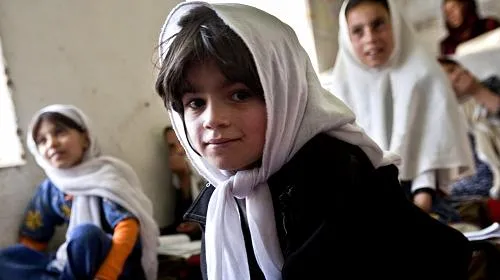WASHINGTON, D.C. (March 12, 2013) – The poverty-fighting organization CARE thanks Congress for including major provisions to address child marriage globally in the passage of the Violence Against Women Act (VAWA). In 2010, 67 million girls under the age of 18 were married, and it is estimated that 142 million girls will be married by their 18th birthday by 2020.
The reauthorization of the Violence Against Women Act, which passed through Congress earlier this month, was signed by President Obama into law last week. While most of VAWA’s focus is on violence against women domestically, the bill includes major provisions that require the U.S. Secretary of State to “design and implement a multi-year, multi-sectoral strategy to end child marriage globally.” This would involve integration of child marriage prevention activities across U.S. global development programs – focused on health, education or economic development – in countries where the practice is most prevalent.
The bill also requires that child marriage be included in the State Department’s annual Human Rights Report. Fittingly, the passage and signing into law of VAWA comes in the midst of the 57th session of the United Nations Commission on the Status of Women, currently taking place at the UN headquarters in New York, where the focus of discussions is the elimination and prevention of violence against women and girls.
“This was truly a collaborative effort. We would like to thank Sen. Durbin, Reps. Schock and McCollum, along with former Sen. Olympia Snowe, for their tireless dedication to ending child marriage, making sure it remains a top priority for the United States,” said Helene D. Gayle, president and CEO of CARE. “And we can’t forget the invaluable work of the Girls Not Brides Coalition and the thousands of advocates that have been a voice for these girls over the past few years. Thanks to this combined effort, prioritizing child marriage has now been signed into law by the President, and we can help secure a brighter future for vulnerable girls around the globe.”
The bill represents a significant step forward for girls globally as well as a major victory for CARE and our partners in Girls Not Brides USA, which CARE co-chairs, along with the International Center for Research on Women (ICRW) and International Women’s Health Coalition (IWHC). This leading coalition of U.S.-based organizations working to end early and forced marriage is affiliated with the Girls Not Brides Global Partnership, which was launched by The Elders in 2010, aimed at building a global movement to eliminate the practice of child marriage and enable girls globally to fulfill their dreams.
Gils Not Brides USA helped facilitate an event during the first ever International Day of the Girl in October 2012 attended by Archbishop Desmond Tutu and Secretary of State Hillary Clinton, where commitments by the U.S. government and private initiatives to prevent child marriage were announced.
Over the last five years, CARE and the Girls Not Brides USA coalition have been working with members of congress to ensure that a comprehensive plan to address child marriage becomes law. CARE has been working closely with congressional champions Sen. Dick Durbin, D-Ill., Rep. Aaron Schock, R-Ill. and Rep. Betty McCollum, D-Minn. The three members of Congress have consistently fought to pass legislation that would reduce the number of child brides and give young girls a chance at a better life. The VAWA bill passed by Congress is the culmination of efforts to make ending child marriage an explicit mandate of U.S. foreign policy.
Rep. Schock became interested in the issue of child marriage when he traveled with CARE on a Learning Tour in September 2010 to Ethiopia. In some parts of the country, more tha half the girls are married by the age of 15 and they are expected to have children the following year. Schock met many young girls, some as young as 9, who fled marriage and were trying to survive in Addis Ababa.
Child marriage is a grave human rights violation that robs girls of their childhood, jeopardizes their health and limits their opportunities for education and socio-economic advancement.
The ripple effects of child marriage are devastating for the girls and their communities. Child brides are twice as likely to be beaten by their husbands and contract diseases, such as HIV, from often much-older partners. These girls also have a significantly higher risk of dying during pregnancy and childbirth than women in their 20s. Child marriage drastically reduces the number of girls receiving education in developing countries – ultimately preventing girls and women from lifting themselves and their communities out of poverty.
CARE’s citizen advocates have played a vital role in helping pass the child marriage provisions. In October 2012, during the first-ever International Day of the Girl celebration, CARE, along with the Girls Not Brides Global Partnership, has engaged in a month-long online and social campaign to end child marriage.
More than 10,000 advocates signed a petition asking former Secretary of State Hillary Clinton to increase political and financial commitments to end child marriage and support married adolescents. Furthermore, in previous years, this issue has been the focus of CARE’s annual advocacy conference, where hundreds of advocates descend on Washington, D.C., to raise their voice around issues impacting marginalized women and girls.
Media Contacts:
Washington, D.C.: Stephanie Chen, CARE, schen@care.org, +1.202.595.2824, +1.404.819.6638

